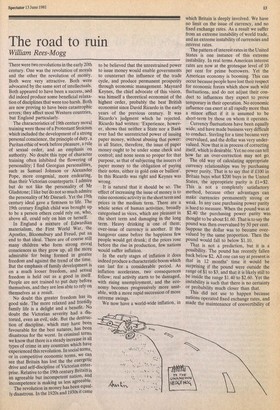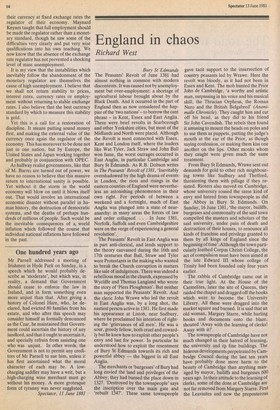The road to ruin
William Rees-Mogg
There were two revolutions in the early 20th century. One was the revolution of morals and the other the revolution of money. Both were very attractive. Both were advocated by the same sort of intellectuals. Both appeared to have been a success, and did indeed produce some beneficial relaxation of disciplines that were too harsh. Both are now proving to have been catastrophic errors; they affect most Western countries, but England particularly.
The characteristics of 19th century moral training were those of a Protestant Stoicism which included the development of a strong personal conscience, the principle of duty, a Puritan ethic of work before pleasure, a rule of sexual order, and an emphasis on authority. No doubt this type of character training often inhibited the flowering of personality; I find Georgian personalities, such as Samuel Johnson or Alexander Pope, more congenial, more endearing, than their Victorian counterparts. I admire but do not like the personality of Mr Gladstone; I like buttdo not so much admire the personality of Mr Disraeli. Yet the 19th century ideal gave a firmness to life. The 19th century English child was brought up to be a person others could rely on, who, above all, could rely on him or herself. In England a mixture of Edwardian materialism, the First World War, the Apostles, Bloomsbury and Freud, put an end to that ideal. There are of course still many children who form strong moral consciences as they grow up, all the more admirable for being formed in greater freedom and against the trend of the time. But the emphasis of family development is on a much looser freedom, and sexual freedom is held out as a good in itself. People are not trained to put duty before themselves, and they are less able to rely on themselves as a result. No doubt this greater freedom has its good side. The more relaxed and friendly family life is a delight and a benefit. No doubt the Victorian severity had a distorted, even an evil, side. But the destruction of discipline, which may have been favourable for the best natures, has been disastrous for the worst. In criminal terms we know that there is a steady increase in all types of crime in any countries which have experienced this revolution. In social terms, or in competitive economic terms, we can see that Britain has lost the the energetic drive and self-discipline of Victorian enter. prise, Relative to the 19th century Britain is an agreeable but incompetent nation, and incompetence is making us less agreeable. The revolution in money has been i equally disastrous. In the 1920s and 1930s t came to be believed that the unrestrained power to issue money would enable governments to counteract the influence of the trade cycle, and produce permanent prosperity through economic management. Maynard Keynes, the chief advocate of this vision, was himself a theoretical economist of the highest order, probably the best British economist since David Ricardo in the early years of the previous century. It was Ricardo's judgment which he rejected. Ricardo had written: 'Experience, however, shows that neither a State nor a Bank ever had the unrestricted power of issuing paper money, without abusing that power: in all States, therefore, the issue of paper money ought to be under some check and control; and none seem so proper for that purpose, as that of subjecting the issuers of paper money to the obligation of paying their notes, either in gold coin or bullion'. In this Ricardo was right and Keynes was wrong.
It is natural that it should be so. The effect of increasing the issue of money is to raise economic activity in the short term and prices in the medium term. There are a whole series of human activities, broadly categorised as vices, which are pleasant in the short term and damaging in the long term. Heavy drinking is one of them; over-issue of currency is another. If the hangover came before the happiness few people would get drunk; if the prices rose before the rise in production, few nations would suffer inflation.
In the early stages of inflation it does indeed produce a characteristic boom which can last for a considerable period. As inflation accelerates, two consequences follow; real activity starts to be damaged, with rising unemployment, and the economy becomes progressively more unstable, with a more rapid succession of more extreme swings. We now have a world-wide inflation, in which Britain is deeply involved. We have no limit on the issue of currency, and no fixed exchange rates. As a result we suffer from an extreme instability of world trade, and an extreme instability of currencies and interest rates.
The pattern of interest rates in the United States is one instance of this extreme instability. In real terms American interest rates are now at the grotesque level of 10 per cent for prime borrowers. Yet the American economy is booming. This can occur because people have lost their respect for economic forces which show such wild fluctuations, and do not adjust their conduct to influences they expect to prove temporary in their operation. No economic influence can exert at all rapidly more than a minor effect if it is assumed to be short-term by those on whom it operates. Currency fluctuations have been equally wide, and have made business very difficult to conduct. Sterling for a time became very overvalued, and the dollar was very undervalued. Now that is in process of correcting itself, which is desirable. Yet no one can tell how far an over-correction may not go. The old way of calculating appropriate currency relationships was by purchasing power parity. That is to say that if £100 in Britain buys what $200 buys in the United States, the appropriate parity is £1=$2. This is not a completely satisfactory method, because other advantages can make currencies permanently strong or weak. In any case purchasing power parity is hard to measure. When the pound was at $2.40 the purchasing power parity was thought to be about $1.60. That is to say the pound was then overvalued by 50 per cent. Suppose the dollar was to become overvalued by the same proportion. Then the pound would fall to below $1,10.
That is not a prediction, but it is a possibility. The pound has recently fallen back below $2. All one can say at present is that in 12 months' time it would be surprising if the pound were outside the range of $1 to $3, and that it is likely still to be inside the range $1.40 to $2.60. Yet the instability is such that there is no certainty or probability much closer than that. This did not use to happen because nations operated fixed exchange rates, and made the maintenance of convertibility of their currency at fixed exchange rates the regulator of their economy. Maynard Keynes taught that full employment should be made the regulator rather than a monetary standard, though he saw some of the difficulties very clearly and put very wise qualifications into his own teaching. We now know that the absence of the exchange rate regulator has not prevented a shocking level of mass unemployment.
It is my view that the instabilities which inevitably follow the abandonment of the monetary regulator are themselves the cause of high unemployment. I believe that we shall not return stability to prices, interest rates, currency rates or employment without returning to stable exchange rates. I also believe that the best currency standard by which to measure this stability is gold.
Yet this is a call for a restoration of discipline. It means putting sound money first, and making the external value of the currency once again the regulator of the economy. This has moreover to be done not just in one nation, but by Europe, the United States and Japan working together and probably in conjunction with OPEC.
As halfway realist governments, like that of M. Barre; are turned out of power, we have no reason to believe that this massive return to international sanity is possible. Yet without it the storm in the world economy will blow on until it blows itself out. That would involve an international economic disaster without parallel in human history, the destruction of democratic systems, and the deaths of perhaps hundreds of millions of people. Such would be the inevitable consequences of a, world inflation which followed the course that individual national inflations have followed in the past.







































 Previous page
Previous page